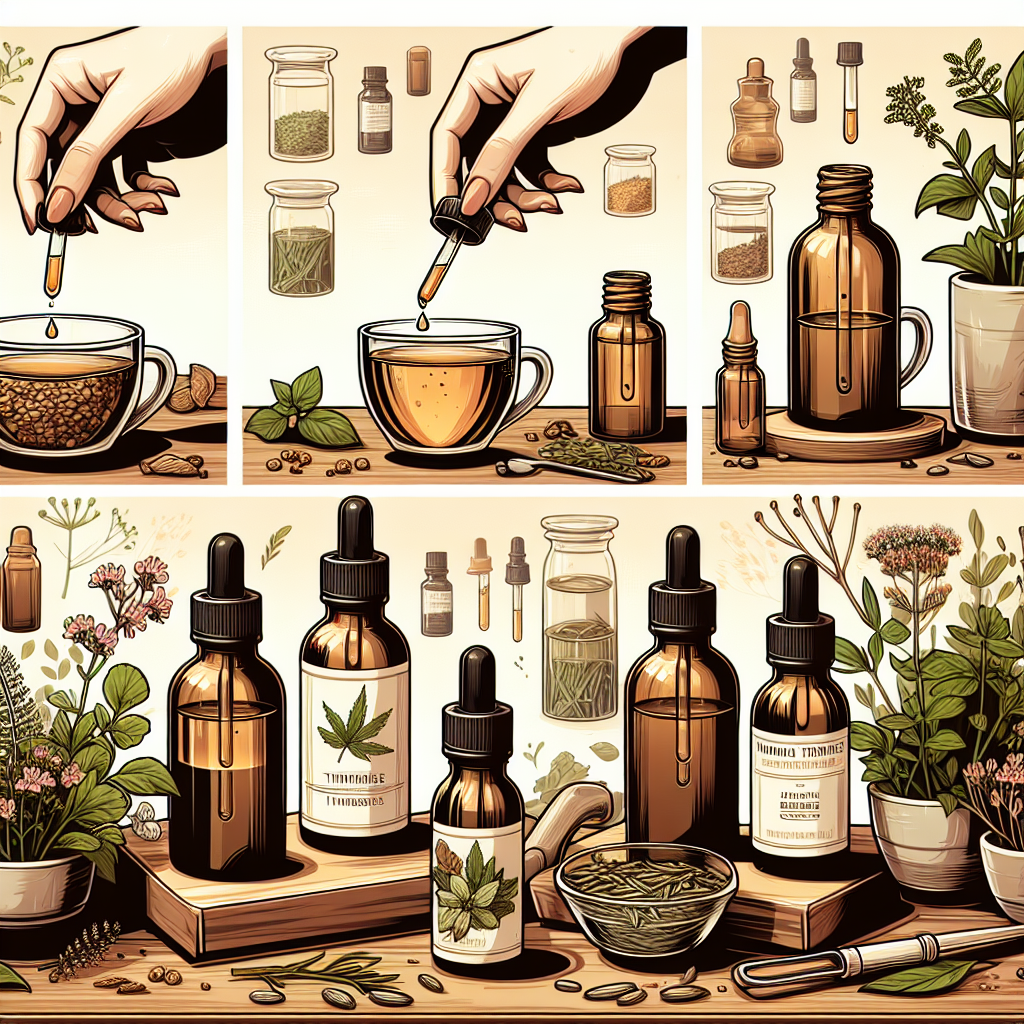How to Use Herbal Tinctures in Daily Life

Discover the benefits of incorporating herbal tinctures into your daily routine. Learn how to use these natural remedies for improved health and wellness. Visit www.myvibrantvitality.com now to get started.
Incorporating Herbal Tinctures into Your Daily Routine: A Comprehensive Guide
Herbal tinctures, potent extracts of herbs steeped in alcohol or vinegar, have been used for centuries as natural remedies for a variety of ailments. Today, they continue to be a popular choice for those seeking a holistic approach to health and wellness. Incorporating herbal tinctures into your daily routine can be a simple and effective way to boost your overall health and wellbeing.
To begin with, it’s important to understand what herbal tinctures are. Essentially, they are concentrated herbal extracts made by soaking herbs in a liquid, typically alcohol, to extract the active components of the herb. The result is a potent liquid that can be taken orally or applied topically, depending on the herb and the desired effect.
Incorporating herbal tinctures into your daily routine can be as simple as adding a few drops to a glass of water or tea. For instance, a tincture made from chamomile might be used to promote relaxation and better sleep, while a tincture made from echinacea could be used to boost the immune system. It’s important to note that the effects of herbal tinctures can vary widely depending on the herb used, the individual taking it, and the dosage, so it’s always a good idea to consult with a healthcare provider or a knowledgeable herbalist before starting any new herbal regimen.
One of the great things about herbal tinctures is their versatility. They can be used in a variety of ways, depending on your needs and preferences. For example, if you’re feeling stressed or anxious, you might add a few drops of a lavender or valerian root tincture to a warm bath for a soothing, calming effect. If you’re battling a cold or flu, a tincture made from elderberry or ginger could be added to hot water with lemon and honey for a comforting, immune-boosting drink.
Another way to incorporate herbal tinctures into your daily routine is by using them in cooking. Many herbs used in tinctures also have culinary uses, and adding a few drops of a tincture can be a great way to enhance the flavor of a dish while also adding a healthful boost. For instance, a tincture made from rosemary could be added to a marinade for chicken or vegetables, while a tincture made from peppermint could be used to add a refreshing twist to a homemade smoothie or iced tea.
In conclusion, herbal tinctures offer a convenient and versatile way to incorporate the benefits of herbs into your daily life. Whether you’re seeking to boost your immune system, promote relaxation, or add a healthful boost to your meals, there’s likely a tincture that can help. As with any health regimen, it’s important to do your research and consult with a healthcare provider or knowledgeable herbalist to ensure you’re using tinctures safely and effectively. With a bit of knowledge and experimentation, you can find the right tinctures and methods of use that work best for you and your lifestyle.
Maximizing Health Benefits: Effective Ways to Use Herbal Tinctures Daily

Herbal tinctures, potent extracts of herbs steeped in alcohol or vinegar, have been used for centuries to promote health and wellness. These concentrated herbal extracts are easy to use, highly portable, and can be incorporated into your daily routine in a variety of ways. This article will explore some effective methods to use herbal tinctures daily, maximizing their health benefits.
To begin with, one of the most straightforward ways to use herbal tinctures is by taking them orally. This can be done by placing a few drops of the tincture under your tongue, where it can be quickly absorbed into your bloodstream. This method, known as sublingual administration, allows the active compounds in the tincture to bypass the digestive system, providing faster and more efficient absorption. However, the taste of some tinctures can be quite strong, so if you find the flavor unpleasant, you can also mix the tincture with a bit of water or juice to make it more palatable.
In addition to taking them orally, herbal tinctures can also be used topically. Many herbs have anti-inflammatory, antiseptic, or soothing properties that can be beneficial for skin conditions. For instance, a tincture of calendula or chamomile can be applied to minor cuts, burns, or insect bites to promote healing and reduce inflammation. Similarly, a tincture of arnica can be used to soothe sore muscles or bruises. To use a tincture topically, simply apply a few drops to the affected area and gently massage it in.
Another effective way to use herbal tinctures is by adding them to your food or drinks. This not only helps to mask the taste of the tincture but also allows you to incorporate the health benefits of the herbs into your meals. For example, a tincture of ginger or peppermint can be added to a cup of tea to aid digestion, while a tincture of lavender or chamomile can be added to a warm bath to promote relaxation and sleep.
Lastly, herbal tinctures can also be used in aromatherapy. Many herbs have aromatic properties that can have a calming, uplifting, or balancing effect on the mind and body. By adding a few drops of a tincture to a diffuser or a hot bath, you can create a therapeutic atmosphere that promotes well-being and relaxation.
In conclusion, there are numerous ways to incorporate herbal tinctures into your daily routine to maximize their health benefits. Whether you choose to take them orally, apply them topically, add them to your food or drinks, or use them in aromatherapy, these potent herbal extracts can be a valuable tool in your wellness arsenal. However, it’s important to remember that while herbal tinctures can support health, they are not a substitute for a balanced diet, regular exercise, and adequate sleep. Always consult with a healthcare professional before starting any new health regimen, especially if you have any pre-existing conditions or are taking other medications.
Herbal Tinctures: How to Seamlessly Blend Them into Your Everyday Life
Herbal tinctures, potent extracts of herbs steeped in alcohol or vinegar, have been used for centuries as natural remedies for a variety of ailments. Today, they continue to be a popular choice for those seeking a holistic approach to health and wellness. Integrating these potent plant extracts into your daily routine can be a simple and effective way to boost your overall health.
To begin with, it’s important to understand what a tincture is. Essentially, a tincture is a concentrated liquid form of an herb that you take by mouth. It’s made by soaking the herb in a solvent, usually alcohol or vinegar, to extract the active components of the plant. The result is a potent liquid that contains all the beneficial properties of the herb in a form that’s easy to consume and absorb.
Incorporating herbal tinctures into your daily life can be as simple as adding a few drops to your morning tea or juice. For instance, a tincture made from ginger can be a great addition to your morning routine if you’re prone to digestive issues. Just a few drops in your tea can help soothe an upset stomach and kick-start your digestion for the day. Similarly, a tincture made from chamomile can be added to your evening tea to promote relaxation and a good night’s sleep.
Moreover, herbal tinctures can also be taken directly under the tongue, a method known as sublingual administration. This method allows the tincture to be absorbed directly into the bloodstream, providing faster and more effective results. For example, a tincture made from echinacea, a herb known for its immune-boosting properties, can be taken this way at the first sign of a cold or flu to help ward off the illness.
However, it’s important to note that while herbal tinctures can be a beneficial addition to your health regimen, they should not be used as a replacement for a balanced diet and regular exercise. They are meant to complement a healthy lifestyle, not substitute it.
Furthermore, it’s crucial to remember that not all herbs are safe for everyone. Some herbs can interact with medications, while others may not be suitable for people with certain health conditions. Therefore, it’s always a good idea to consult with a healthcare professional before starting any new herbal regimen.
In addition, the quality of the tincture can significantly impact its effectiveness. Therefore, it’s recommended to purchase tinctures from reputable sources that use high-quality, organic herbs. This ensures that you’re getting a product that’s free from harmful pesticides and other chemicals.
In conclusion, herbal tinctures offer a convenient and effective way to harness the healing power of plants. Whether you’re looking to boost your immune system, improve digestion, or simply promote overall wellness, these potent extracts can be a valuable addition to your daily routine. By understanding how to use them properly and safely, you can seamlessly blend herbal tinctures into your everyday life and reap the numerous health benefits they have to offer.